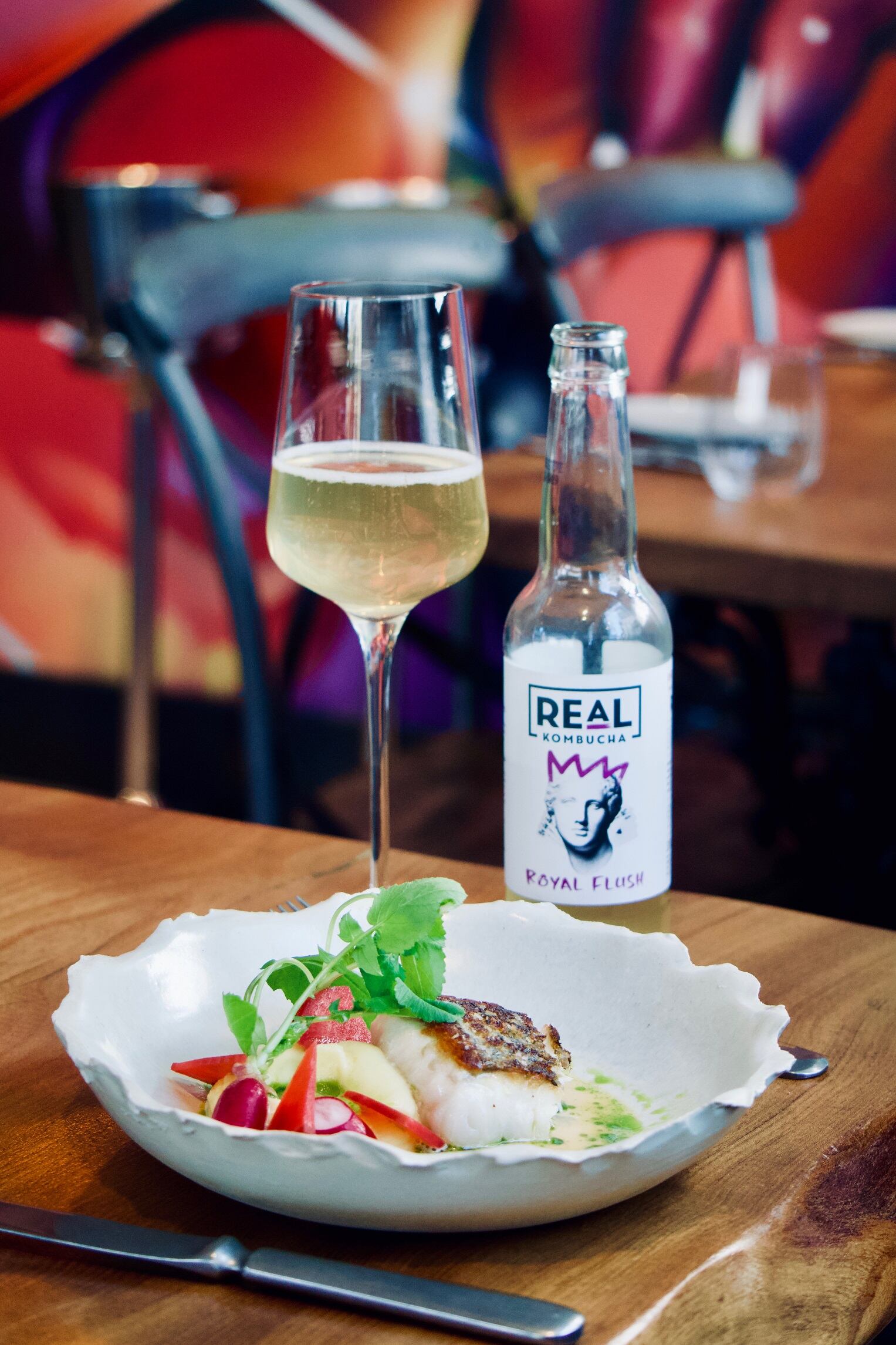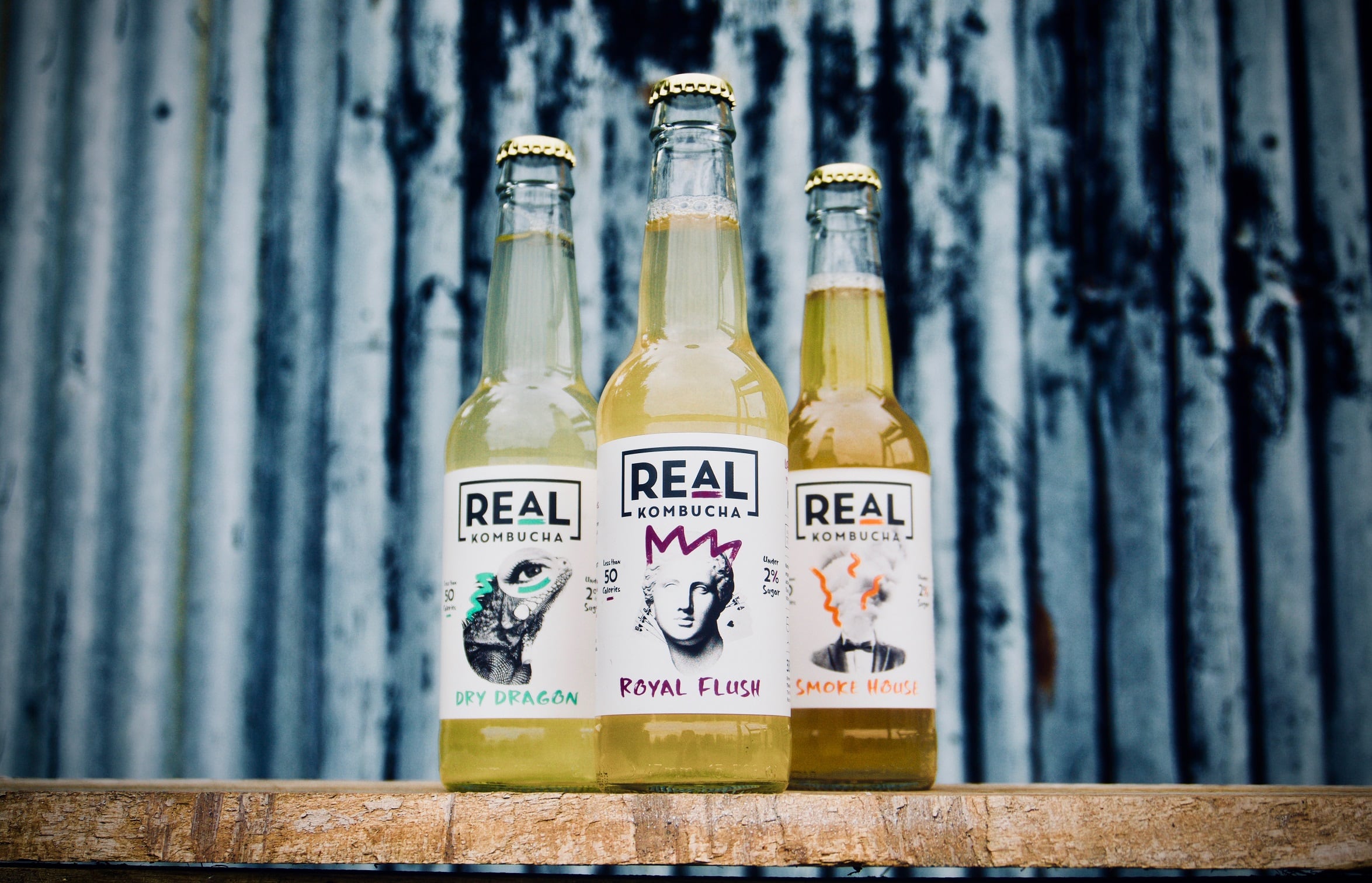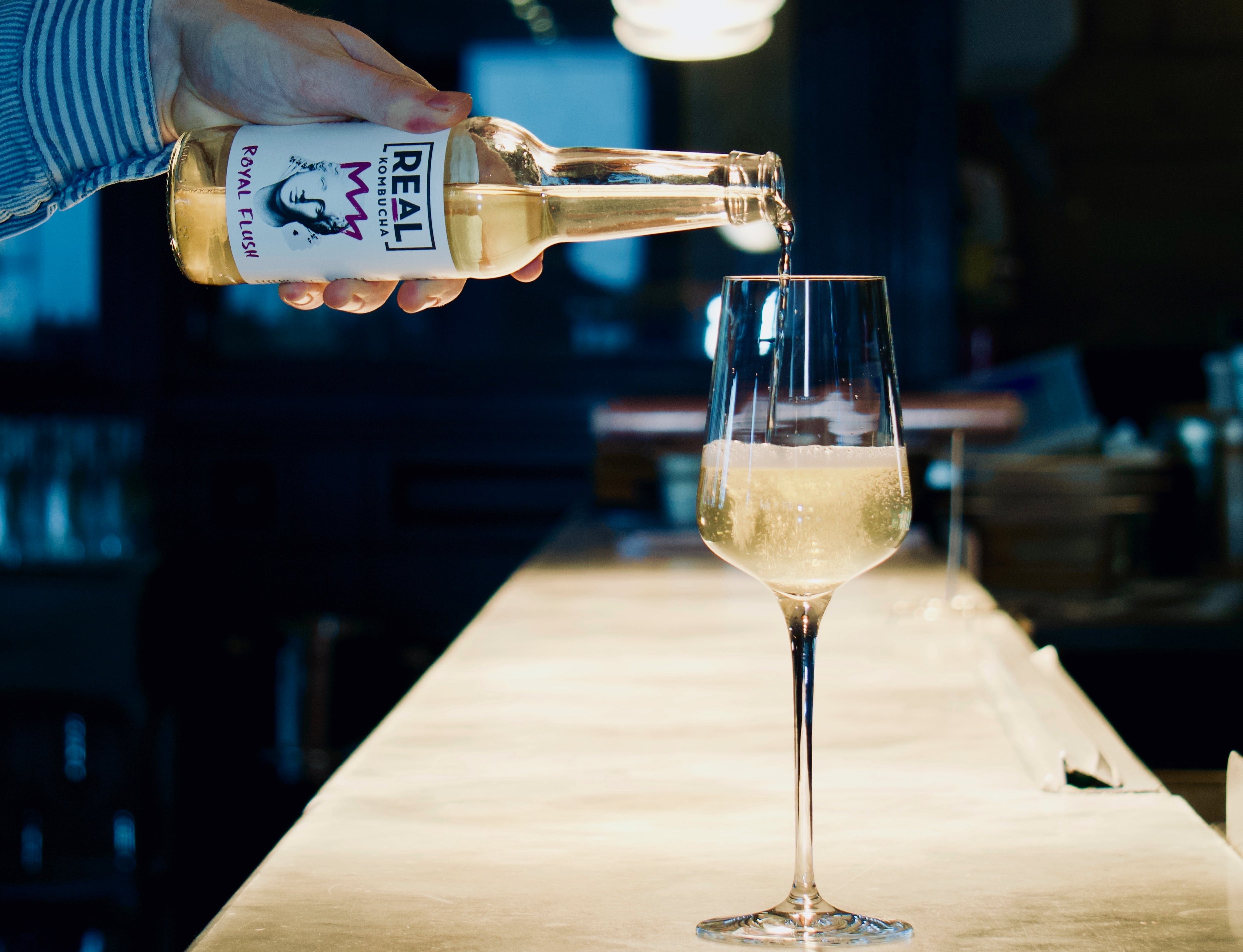Kombucha’s unique and complex flavour profile can ‘pop the taste buds’ in the same way as alcohol, offering a sophisticated and satisfying alternative, says David Begg, founder and CEO of the British non-alcoholic kombucha brand.
And he believes it’s this slightly tart flavour profile that will prove the biggest success in the market for low/no alcohol alternatives; avoiding the sickly sweetness of many other drinks.
Dry Dragon and Smoke House
Begg founded Real Kombucha in 2016, when he had all but given up drinking. A big lover of food, he missed the experience of pairing a great wine with great food.
Alongside nutrition innovator Adrian Hodgson and tea expert Will Battle, he experimented with 150 different teas until he came up with three brews for Real Kombucha: all which ‘build on the delicacy of our teas with complex floral and fruity flavours, astringency and subtle acidity more commonly seen in the most carefully crafted alcoholic brews’.
Real Kombucha’s brews are not flavoured or sweetened: instead drawing all their flavour from high-end fermented teas. The three varieties are Dry Dragon (‘citrusy and refreshing… the ideal non-alcoholic alternative to a Sauvignon Blanc’); Royal Flush (a sophisticated non-alcoholic fizz… a great alternative to Champagne or Prosecco’) and Smoke House (‘full-bodied with rich notes of caramel and apple… wonderful for long nights in’).
"Our fermented tea is probably a closer cousin to Champagne than most kombuchas on the market"

A key part of building up the brand has been pairing it with food in the same way wine is usually paired with food. This may at first seem like an odd fit, given kombucha’s distinctive and tart profile.
But Begg sees a white space in the fine dining sector, where sugary drinks can't replace alcoholic ones - "You don’t put a sweet soft drink alongside great food, it kills the taste buds, kills the flavour of the food".
And Real Kombucha is not a haphazardly home brewed craft concoction: Begg makes no apologies for a well-researched, scientific approach to fermentation. The acidity is similar to that of white wine; as is the way to flavour builds and finishes on the tongue and in the mouth.
“Our fermented tea that is probably a closer cousin to a Champagne than most soft drink kombuchas on the market,” said Begg.
“These kombuchas brew a simple acidic base which is then flavoured with spices and juices to make a healthier alternative to a soft drink. All the flavour of Real comes from the high-end teas we brew with and the sophistication of our fermentation process that enables us to lift delicate notes in a similar manner to fermenting a fine wine. We add nothing post fermentation.
“As we have spent years developing a much more sophisticated fermentation process, we don't produce the pungent, acidic notes that you may come across in soft drink kombuchas. Our flavours tend to be light, delicate and fruity with a soft acidity rather than a vinegary punch”.
The result, he says, is a kombucha that pairs ‘exceptionally well with food’.
“Most of the top chefs, restauranteurs and sommeliers we work with consider us to be the best non-alcoholic drink on the market when it comes to food pairing. The delicate acidity (similar to a white wine), the low sugar (only 2-3%), and the complexity of flavour that comes out in fermentation all contribute to this.
“There are few situations where we cannot pair. Cheeses can sometimes be a challenge - a strong, pungent cheese, paired with the acidic complexity of our drinks can give too much acidity- but in a similar way to some wines. Soft and delicate cheeses can be great food pairings.”
Kombucha food pairings
- Royal Flush has notes of rhubarb and white peach: Pair as per a full bodied white: white fish, white meat, cream sauce, anything umami.
- Dry Dragon has notes of lemon and grapefruit: Pair as a citrusy white wine: green vegetables, shellfish, salads and fruit.
- Smoke House has notes of apple and caramel: Pair as a red: red meat, barbecue, South Asian spices, dark chocolate desserts.
Real Kombucha is now available in 60 Michelin restaurants as well as pub chains, hotels and caterers. But how did the brand convince top food chefs to even consider kombucha?
“We didn't actually go out to target this market initially,” admits Begg. “We felt we had a great drink, but didn't know quite how good it was.
“But we got picked up by restaurants such as The Fat Duck, Hakkasan, Nathan Outlaw and Sat Bains very early on and this gave us the confidence to knock on many more doors.
“The reception we've had has been amazing. We have a close to 100% success rate in the high-end restaurant market once they have tried our drinks.
"One sommelier told me we've opened up an 'entirely new flavour palate' for him. For the first time, he has a complex, sophisticated non-alcoholic drink that he can play with in food pairing.
"But it is not only the non-alcoholic element that is important as we have had sommeliers selecting to pair dishes with our drinks in preference to wines as there are times when our kombuchas are a better pairing than any wine.”
Kombucha cocktails
Kombucha cocktails are another new world the brand is exploring. “Due to the high acidity and low sugar content, Real is a great base for creating low and no cocktails,” said Begg.

“There is the clear advantage of being able to create non-alcoholic cocktails that pack the full fermented flavour of an alcoholic cocktail.
“But what is particularly amazing is the way that Real is able to draw out the flavours of spirits. Due to the low sugar/high acidity we really lift flavours of gins, whiskies, rums and other spirits.
"You can create full flavoured cocktails with just 5-10ml of a spirit, topped up with Real and the flavours punch out of the glass.”
The brand is still exploring the flavours and concoctions that kombucha can create: adding the recipe for the best creations to its website as it goes along.
“Our favourite mixologists use a wide range of flavours in combination with Real. It will depend a lot on the style. For example, Dry Dragon, with its citrusy notes, pairs well with citrus and mint as in the Dry Dragon Mojito. And Smoke House, with notes of apple and caramel, is great with ginger.”
For Begg, the modern drinker is looking for flavour, sophistication and a product that – while not necessarily healthy - is definitely not unhealthy either. And he believes kombucha can come out ahead of the pack of alcohol alternatives, thanks not only to its unique flavour profile, but because it looks at home in bars and restaurants where soft drinks may struggle to look convincing.
“There’s water – it’s great, it’s healthy, but you’re never going to get the sophistication out of it, the complex experience," he said. "Soft drinks – when you’re out in the bar, they just don’t do the same thing. I love what’s happening in non-alcoholic spirits, they have paved the way for the sophistication serve, but people are still sticking a [sugary] tonic with them.
"A pure, straight serve kombucha is pretty much the only thing in the market that will give you the complexity, the acidity, the nature of the serve, and sits in the same place as wine.”
Hitting the (not-so-sweet) spot
While kombucha’s popularity has been growing, the category still faces a number of challenges. The first is the quality of a number of kombuchas out on the market – ‘there’s some pretty horrible stuff out there’ - says Begg; while there's little regulation or control for the category. Kombucha has traditionally been a home-brewed, craft industry: leading to a hippy image that may put some mainstream consumers off.
In addition, kombucha has only recently made its way into the soft drink mainstream – and so raising awareness of its potential as an alternative for traditional alcohol occasions is another step again.
But with a shift away from both sugar and alcohol, Begg is optimistic about the future of kombucha.
“I think we’re going to see sour beginning to replace sweet as a primary flavour profile. How fast that’s going to happen I don’t know, but sour is becoming much more important. And it is, in my view, the only thing that can effectively replace sugar and give you a really full flavour profile."


